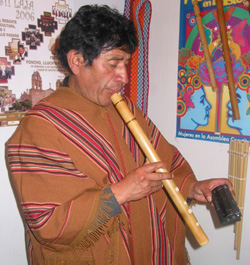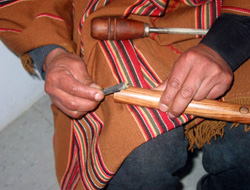 When the music world invites you in, it is hard to say, “No, thanks.” Agustín Portillo, who has been enriching Bolivian folklore for more than 30 years, knows this well. As an empirical musician and a wonderworker with the quena, he formed his first group, the Puma Punku, in 1977. From that time on he decided to live by and for music.
When the music world invites you in, it is hard to say, “No, thanks.” Agustín Portillo, who has been enriching Bolivian folklore for more than 30 years, knows this well. As an empirical musician and a wonderworker with the quena, he formed his first group, the Puma Punku, in 1977. From that time on he decided to live by and for music.
Years later, Agustín acquired a new interest: manufacture of wind instruments. Many days of learning were necessary to achieve this. “Before, the holes were made in the quenas with a hot iron, and the tuning was done by ear.” In spite of the rudimentary production technique, the sound of his creations was what he demanded as a musician.
Thanks to his art, Agustín lived in Europe for eight years where his musical techniques grew along with his family. His two sons are chips off the old block, so to speak, with their promising musical talent.
 Today, Portillo continues to enchant with his melodies and creating his wind instruments with the help of his wife María Luisa. To produce quenas, quenachos, zampoñas and antaras, Agustín obtains bamboo from a specific region of La Paz (Los Yungas and Alto Beni). Bamboo is a damp material, covered internally with a liquid that takes a while to dry when pulled up by the root – as much as two months. After this period, the craftsman changes the bamboo structure with his wife’s help by hand smoothing to achieve the necessary shape. The process is less complicated for the tarka since the blocks of mara wood for this instrument are cut to measure.
Today, Portillo continues to enchant with his melodies and creating his wind instruments with the help of his wife María Luisa. To produce quenas, quenachos, zampoñas and antaras, Agustín obtains bamboo from a specific region of La Paz (Los Yungas and Alto Beni). Bamboo is a damp material, covered internally with a liquid that takes a while to dry when pulled up by the root – as much as two months. After this period, the craftsman changes the bamboo structure with his wife’s help by hand smoothing to achieve the necessary shape. The process is less complicated for the tarka since the blocks of mara wood for this instrument are cut to measure.
Agustín makes use of a chromatic tuning fork to tune the instrument, and thanks to the couple’s endeavor, the end result is a quality instrument with a meticulous, fine finish.


